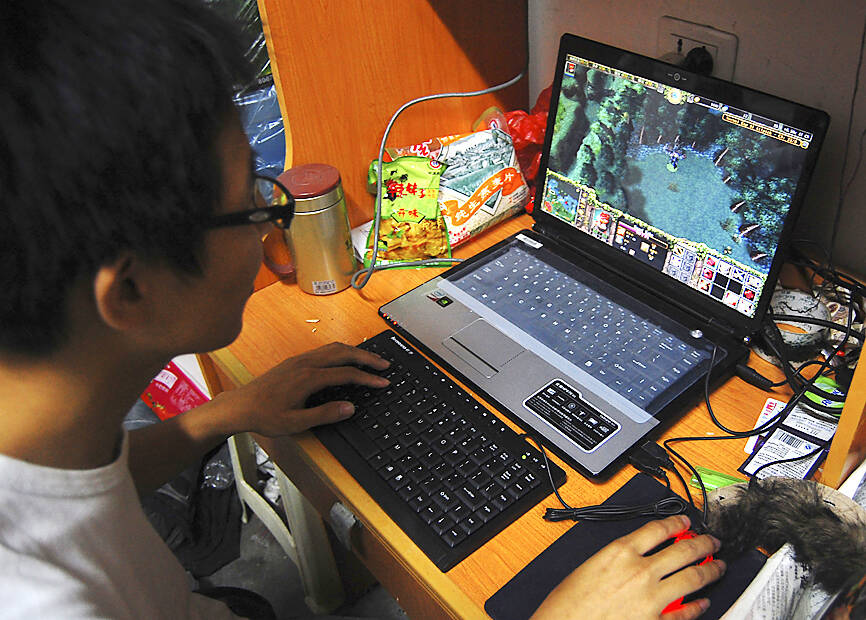Millions of Chinese gamers have lost access to World of Warcraft after a furious dispute between US title owner Activision Blizzard Inc and NetEase Inc (網易), its longtime local partner in the world’s biggest gaming market.
Devotees of the popular game took to social media networks to bemoan the loss, with one posting an image of a failed connection message accompanied by crying emojis.
“It really hurts my heart,” one wrote. “It hurts, it hurts too much,” another said.

Photo: AP
Massively popular worldwide, particularly in the 2000s, World of Warcraft — often abbreviated as WoW — is an online multiplayer role-playing game set in a fantasy Medieval world where good battles evil.
It is known for its immersive and addicting gameplay, and players can rack up hundreds of hours of game time.
Blizzard’s games have been available in China since 2008, through collaboration with NetEase — under local law, foreign developers are required to partner with Chinese firms to enter the market.
The 14-year partnership had brought significant benefits to both sides, helping NetEase become China’s second-biggest games distributor after Tencent Holdings Ltd (騰訊) and giving Blizzard a way into an enormous Asian market.
However, the two companies broke off talks late last year on a new licensing agreement to make Blizzard franchises like Diablo, Warcraft and Overwatch available in China.
The acrimony escalated this month when NetEase accused its longtime partner of being “rude and inappropriate.” Blizzard had offered to extend their licensing agreement another six months while they work out new terms, but NetEase described the idea as “proposing a divorce while still engaging with the same partner.”
Beyond financial terms, the key sticking points in the dispute included ownership of intellectual property and control of the data of millions of players across China, Bloomberg News previously reported. In its January statement, NetEase said it never sought to control IP rights in its tie-up with Blizzard, whose gaming assets it only used upon mutual agreement.
Servers hosting Blizzard’s games shut down in China at midnight on Monday. The company has promised to let World of Warcraft players save their progress with a new service. NetEase warned that it cannot guarantee the safety of that service, saying it may pose a security risk.
Rather than taking sides in the corporate dispute, for ex-players the dominant sentiment expressed on social media was disappointment.
“It is truly a sad day for World of Warcraft players and Blizzard Entertainment fans everywhere,” one wrote online. “The sudden shutdown is a stark reminder of impermanence, displacing millions of players.”

Semiconductor shares in China surged yesterday after Reuters reported the US had ordered chipmaking giant Taiwan Semiconductor Manufacturing Co (TSMC, 台積電) to halt shipments of advanced chips to Chinese customers, which investors believe could accelerate Beijing’s self-reliance efforts. TSMC yesterday started to suspend shipments of certain sophisticated chips to some Chinese clients after receiving a letter from the US Department of Commerce imposing export restrictions on those products, Reuters reported on Sunday, citing an unnamed source. The US imposed export restrictions on TSMC’s 7-nanometer or more advanced designs, Reuters reported. Investors figured that would encourage authorities to support China’s industry and bought shares

TECH WAR CONTINUES: The suspension of TSMC AI chips and GPUs would be a heavy blow to China’s chip designers and would affect its competitive edge Taiwan Semiconductor Manufacturing Co (TSMC, 台積電), the world’s biggest contract chipmaker, is reportedly to halt supply of artificial intelligence (AI) chips and graphics processing units (GPUs) made on 7-nanometer or more advanced process technologies from next week in order to comply with US Department of Commerce rules. TSMC has sent e-mails to its Chinese AI customers, informing them about the suspension starting on Monday, Chinese online news outlet Ijiwei.com (愛集微) reported yesterday. The US Department of Commerce has not formally unveiled further semiconductor measures against China yet. “TSMC does not comment on market rumors. TSMC is a law-abiding company and we are

FLEXIBLE: Taiwan can develop its own ground station equipment, and has highly competitive manufacturers and suppliers with diversified production, the MOEA said The Ministry of Economic Affairs (MOEA) yesterday disputed reports that suppliers to US-based Space Exploration Technologies Corp (SpaceX) had been asked to move production out of Taiwan. Reuters had reported on Tuesday last week that Elon Musk-owned SpaceX had asked their manufacturers to produce outside of Taiwan given geopolitical risks and that at least one Taiwanese supplier had been pushed to relocate production to Vietnam. SpaceX’s requests place a renewed focus on the contentious relationship Musk has had with Taiwan, especially after he said last year that Taiwan is an “integral part” of China, sparking sharp criticism from Taiwanese authorities. The ministry said

US President Joe Biden’s administration is racing to complete CHIPS and Science Act agreements with companies such as Intel Corp and Samsung Electronics Co, aiming to shore up one of its signature initiatives before US president-elect Donald Trump enters the White House. The US Department of Commerce has allocated more than 90 percent of the US$39 billion in grants under the act, a landmark law enacted in 2022 designed to rebuild the domestic chip industry. However, the agency has only announced one binding agreement so far. The next two months would prove critical for more than 20 companies still in the process